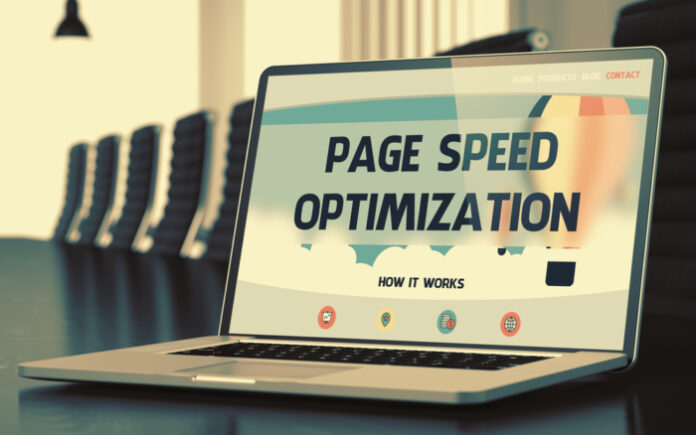Doing everything right but your website still is not ranking well? When is the last time you checked your website’s page speed? Did you know Google uses your site’s loading speed to determine how high to rank your website in search engine results? Every enterprise SEO campaign MUST include efforts to optimize your site’s loading speeds! In this article, we explain what exactly SEO is, how page speed affects SEO, and what you can do to improve your website’s page speed. Keep reading to learn more!
First of All, What Is SEO?
SEO stands for search engine optimization, which is a set of techniques that aim to increase the quantity and quality of organic traffic to a particular webpage or website. Through these techniques, SEO helps your website rank higher in search engine results. Because the overwhelming majority of users don’t venture much further than the first page, it’s important for your business to rank on the first page of search results at the very least, with the first three positions being optimal.
How Are Rankings Determined?
There are multiple ranking factors that influence where a webpage appears in the search engine results. Every webpage is scanned and indexed by Google’s web crawler, which is then rated by Google’s very sophisticated algorithm. The algorithm uses 210 known factors to determine a page’s rankings. The higher the search result ranking, the more relevant, authoritative, and trustworthy it has been deemed by Google.
How Does SEO Work?
Because Google is constantly releasing new algorithm updates, keeping up with new SEO recommendations is really important if you want to improve or sustain your rankings. Despite the algorithm adjustments, the core factors of SEO remain basically the same. Based on Google’s ranking factors, these three branches of SEO address all possible areas you can improve on your site in order to get it to rank.
On-page SEO
On-page SEO is all about the look and feel of your site — the content and user experience. This pillar of SEO focuses heavily on keyword targeting and positioning, as well as optimizing title tags, meta descriptions, and image file names. User experience includes the website’s design, its flow, ease of use, and the quality of its content.
Off-page SEO
Off-page SEO is exactly what it sounds like ― working on your website’s rankings with activities outside the site. This mainly includes building high authority domain backlinks, which are basically guest posts on other sites that link back to your website. This shows Google that your site is trustworthy and authoritative, thus rewarding you with better rankings.
Technical SEO
Technical SEO focuses on how your website operates behind the scenes, relating to all things outside of content. This branch of SEO works to improve how easy your site is to crawl, load, and interact with. Working on technical SEO includes fixing website errors, applying an XML sitemap, applying the correct code, and … improving page speed!
So, What Does Page Speed Have to Do with SEO?
Improving page speed falls into the category of technical SEO, but why is it so important for overall rankings? Well, a fast loading page speed is crucial for multiple reasons. Not only does it improve the overall user experience, but it also increases conversions and boosts rankings. Users are turned off and frustrated by slow-loading pages, and as a result, they more likely click away from your website. If you have a user that interested in becoming a customer, the user will be more likely to navigate to the goal page if your website is loading efficiently. Google, which has confirmed that page speed is indeed a ranking factor used by their algorithm, rewards your website for having a good page speed score for that reason.
How to Calculate Page Speed
Page speed measures how fast and efficiently all the content on your website takes to load. It is also determined by how fast it takes the web server to communicate your website’s content to the browser, known as “time to first byte.” Page speed tools will evaluate how long it takes for content to display, and determine whether it is displaying correctly.
What Is a Good Page Speed Score?
Your website will have different loading times according to the user’s device. For example, desktop loading times are usually much faster than mobile times. Desktop speeds reaching 90 or above are good. While the same standard applies to mobile platforms, an average mobile page speed is around 40.
How to Improve Page Speed
Thankfully, there are plenty of ways to improve page speed. Optimizing page speed may look different across management platforms like WordPress, Shopify, Webflow, etc. In addition, not every technique may work for your particular website. However, here are some tried and tested recommendations that typically work for all sites.
Compress Images: The larger the image, the more time it takes to load. Appropriately size all the images on your website to around 300 KB or less.
Turn on Browser Caching: Browsers can collect user data and browsing habits. Turning on this feature will allow the server to store the user’s browser information and load the page much quicker the next time the user returns to your site.
Implement a CDN: A CDN is a content delivery network that geographically distributes your website content across proxy centers and servers worldwide. This means a user from outside of your country can access your website with similar page speeds to that of a user from your country.
Get a Better Hosting Site: Shared hosting sites smush multiple websites onto the same server. This can result in slow loading speeds during your peak traffic times. Investing in a high-quality cloud-hosting site produces better loading speeds for your website.
Hire a Digital Marketing Agency: A digital marketing agency can help optimize your website for search engines and increase traffic to your site, which will boost your SEO. Linchpin, an SEO agency, recommends hiring an SEO expert to audit your website and tell you where it can be improved.
Conclusion – Why Page Speed Is Important for SEO
Therefore, now that you know what page speed is and why it’s important for SEO, it’s time to check your website’s loading speeds. Outrank your competitors with better page speed performance! Improve your website’s user experience, conversion rate, and overall rankings — all by improving your website’s page speed.
Find a Home-Based Business to Start-Up >>> Hundreds of Business Listings.
















































